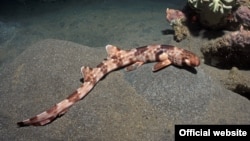OFF HALMAHERA, INDONESIA —
A new species of epaulet shark has been discovered in waters off a remote Indonesian island. Officially called Hemiscyllium halamhera, the shark was first seen by divers in 2008 as it “walked” along sea floor, but has only now been identified as a new species.
The newly discovered shark is a new species of epaulet, or “walking shark”, characterized by its method of foraging for smaller fish and crustaceans using its pectoral and pelvic fins to “walk” along the sea floor. The shark is believed to only inhabit the waters around islands to the west of Halmehera.
The species is colored by dark brown and white spots on a light brown background. H. halmahera is generally small and slender with a maximum length of up to 80cm.
The nine known species of walking shark inhabit very restricted ranges in shallow water.
Researchers from Conservation International and the Western Australian Museum, who were involved in the discovery, say the find has important ramifications for marine conservation in the area.
“After nearly three decades as the world's largest exporter of dried shark fins and other shark and ray products, Indonesia is now focusing on the tremendous economic potential of its sharks and rays as living assets,” said Mark Erdmann, Conservation International's senior advisor to the Indonesian Marine Program.
The Indonesian government says it agrees that says such discoveries feed a growing awareness in the country of the “important ecological role that sharks play in maintaining healthy fish stocks and especially in the tremendous economic potential” of marine tourism.
The newly discovered shark is a new species of epaulet, or “walking shark”, characterized by its method of foraging for smaller fish and crustaceans using its pectoral and pelvic fins to “walk” along the sea floor. The shark is believed to only inhabit the waters around islands to the west of Halmehera.
The species is colored by dark brown and white spots on a light brown background. H. halmahera is generally small and slender with a maximum length of up to 80cm.
The nine known species of walking shark inhabit very restricted ranges in shallow water.
Researchers from Conservation International and the Western Australian Museum, who were involved in the discovery, say the find has important ramifications for marine conservation in the area.
“After nearly three decades as the world's largest exporter of dried shark fins and other shark and ray products, Indonesia is now focusing on the tremendous economic potential of its sharks and rays as living assets,” said Mark Erdmann, Conservation International's senior advisor to the Indonesian Marine Program.
The Indonesian government says it agrees that says such discoveries feed a growing awareness in the country of the “important ecological role that sharks play in maintaining healthy fish stocks and especially in the tremendous economic potential” of marine tourism.





